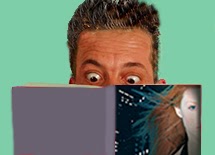HOW TO KEEP YOUR READERS READING
“Nobody reads a mystery to get to the middle. They read it to get to the end. If it’s a letdown, they won’t buy any more. The first page sells that book. The last page sells your next book.” __Mickey Spillane
“The first page sells that book.” Mickey Spillane understood the concept that the job of the opening lines of a book, a short story, or an essay is to grab the reader’s attention so that they have no choice but to continue reading. Spillane sold over 225 million copies of his books.
“The first page sells that book.” Mickey Spillane understood the concept that the job of the opening lines of a book, a short story, or an essay is to grab the reader’s attention so that they have no choice but to continue reading. Spillane sold over 225 million copies of his books.
I’m a FFLR - a first few lines
reader. I sail through bookstores reading the first few lines from an
assortment of books—classics, not so classic, and bestsellers alike. The first
few lines (or paragraphs) should attract the reader’s attention, set the stage
for the rest of the story, and should be an indication as to the theme and
genre of the story.
The first few lines are also a way
in which the author introduces himself. It’s his/her way of saying “hello.” Sometimes an author will start his story slowly, bowing courteously like a Japanese host. Some authors go a
step further using the hot, wet, clammy dead-fish-in-your-hand handshake.
(Yuck.) Then there are those that use the hardy handclasp, which indicates a
warm, neighborly and inviting hello. Finally, some authors use the screaming,
slap-on-your-back, two-fisted, hand-over-hand handshake that literally pulls
the reader into the story, like it or not.
Personally, I like to wake the
reader with a hold-on-to-your-hat first few lines, grabbing the reader and never letting go. Here are the opening
lines from my mystery/thriller novel The Deal Master:
Before
she could react, he attacker her. He flung her backwards onto the floor and
lunged at her, pressing the cold steel blade of a pearl-handled straight razor
menacingly against the side of her neck. His face, only inches from hers, began to sweat. “Don’t move,” he
said through clenched teeth.
And here are the first few lines
from my theatrical comedy, Discipline:
HAROLD: I find that no two nipples are alike - even
on the same person.
LILLY:
It’s not polite to compare them.
HAROLD:
I wouldn’t know why.
LILLY:
I wouldn’t think you would, so I’ll tell you.
Notice how in both examples the
atmosphere of the story is clearly laid out. There is no question as the genre
of either story.
So, go back and change those
expository boring first few lines you used to begin your story. Grab the
reader’s attention. Shake him/her about. Keep your reader reading. Make your first
impression impressionable. You may not get a second chance.




Comments
Post a Comment